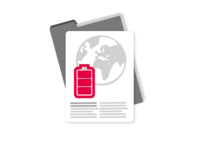As reported by the Council of the European Union, it reached an agreement ("general approach") on 18 December 2023 on a proposal for a regulation on packaging and packaging waste (PPWR). It serves as a mandate for negotiations with the European Parliament on the final form of the legal act. The proposal covers the entire life cycle of packaging.
Here is an overview of the important contents and points:
- New requirements ensure that packaging is safe and sustainable
- Recyclability is mandatory for all packaging
- Substances of concern are minimised
- Labelling regulations improve consumer information
- Definition of binding reuse targets
- Certain types of disposable packaging are restricted
- Economic operators are obliged to use as little packaging as possible
- Packaging should be collected, sorted and recycled to the highest possible standard
- Criteria for the extended producer responsibility regime and provisions on waste management are defined
- Member States are given flexibility to maintain existing well-functioning systems or to establish packaging waste prevention measures that go beyond the minimum targets mentioned above
This was retained by the Council:
- The scope of the Commission proposal, which covers all packaging regardless of the material used and all packaging waste regardless of its origin (including industry, manufacturing and retail companies, households)
- Most of the sustainability requirements proposed by the Commission for all packaging placed on the market and the core targets have been retained
- As proposed by the Commission, all packaging placed on the market must be recyclable
- The core targets for 2030 and 2040 with regard to a minimum recycled content in plastic packaging have been retained
- As in the Commission's proposal, the general approach sets general headline targets for the reduction of packaging waste based on 2018 volumes: 5% by 2030, 10% by 2035 and 15% by 2040
- The Council has maintained the Commission's criteria for the definition of reusable packaging. A minimum number of rounds or cycles of their use is introduced, although the minimum number of cycles for cardboard is lower due to other characteristics of this material
- The Council has retained most of the obligations for economic operators, producers, importers and distributors contained in the Commission's proposal.
This was tightened up by the Council:
- The requirements for substances in packaging will be tightened by requiring the Commission to prepare a report on the presence of substances of concern in packaging by 2026 with the support of the European Chemicals Agency.
- The Council has tightened the obligations for logistics service providers to ensure that producers using such services do not evade their obligations under extended producer responsibility (EPR).
This was changed by the Council:
The Council amended the proposal with regard to recyclable packaging. The Member States agreed that packaging is considered recyclable if:
- packaging is designed with recycling in mind,
- waste packaging collected separately,
- sorted,
- can be recycled (applies from 2035).
Other changes agreed by the Council include further clarifications on the labelling of packaging to ensure that consumers are well informed about the material composition of packaging and its correct disposal when it becomes waste. The Council has also introduced some flexibility to take account of the labelling systems already in place in some Member States.
The Council has postponed the date of application of the regulation to 18 months after its entry into force.
Reuse and refilling of packaging
- Setting new reuse and refill targets for 2030 and 2040
- Different targets for large household appliances, transport packaging (excluding packaging for hazardous goods or large equipment and flexible packaging that comes into direct contact with food) and secondary packaging, among others.
- Cardboard packaging is exempt from these requirements.
- Economic operators can join forces to achieve the reuse targets for beverages.
Restrictions on certain packaging formats
- Introduction of restrictions for certain packaging formats, including
- Disposable plastic packaging, e.g. for small cosmetics and toiletries for use in the hospitality sector (e.g. shampoo or body lotion bottles).
Next steps
The general approach serves as a mandate for the Council to negotiate with the European Parliament on the finalisation of the legal act. The outcome of the negotiations must be formally adopted by the Council and the Parliament.
No time to follow the further developments of the EU packaging regulation (PPWR) in detail? trade-e-bility keeps you up to date with the Legal Monitoring Service. This means you only receive the information that is relevant to you and your product. And we help you with implementation. The trade-e-bility consulting team will also be happy to provide you with solutions for EU product labelling, packaging labelling and, in particular, disposal labelling via beratung@trade-e-bility.de or +49/40/750687-300.
take-e-way will be happy to answer your questions about WEEE, the German Electrical and Electronic Equipment Act, the German Batteries Act, the German Packaging Act/packaging subject to system participation and the EPR on +49/40/750687-0 or beratung@take-e-way.de and will help you with registration/licensing.
For information on our international compliance services in connection with the placing on the market of electronic devices, batteries/rechargeable batteries and packaged products or packaging, please click here: https://www.take-e-way.com/international-compliance/



